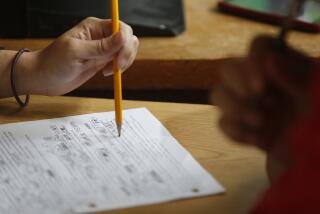Seems Taking a Final Exam Is Everyone’s Worst Nightmare
- Share via
In Karin Salber’s final-exam nightmare, she finds herself before a psychology class to give a 25-minute oral presentation, but she is up to her waist in notes. Frantically diving through the paper, she fails to retrieve the printout of her presentation.
As if that weren’t enough, the next night, the 21-year-old Cal State Fullerton undergrad has final-exam nightmare part two. She is to give a slide presentation for the same class but, somehow, vacation slides end up in the projector. She fumbles madly for the correct slides but each time she thinks she has them . . . viva Las Vegas!
UC San Diego student Azita Nahai’s final-exam nightmare goes like this: She shows up for a three-hour essay final but cannot read the questions. They are all blurry. Panicked, she whispers her plight to nearby students but they tell her to be quiet.
Anxious undergraduates--well into the throes of exam season--often find their too-scarce sleep tormented by such nightmares. The dream is an immediate expression of their fear that somehow they will blow it, manifested in scenarios of oversleeping on test day, getting lost on the way to the building, showing up without a pencil, forgetting to attend class all semester or finding the exam is in a foreign language.
But what is perhaps most interesting, say dream experts, is that a final-exam nightmare can haunt us for a lifetime as the metaphor for feeling unprepared or unfairly evaluated. It is considered as universal as falling dreams and crosses all cultures and generational lines.
“It is the classic anxiety dream,” says Robert Van de Castle, professor emeritus of psychology at the University of Virginia and author of “Our Dreaming Mind” (Ballantine, 1994). “It has been extended to actors forgetting their lines, baseball players afraid of striking out and TV reporters forgetting their cues. The underlying feeling is that your competence or mastery of a given area is coming under scrutiny . . . your moment of truth is coming up. . . . The cue is usually something in our waking life that causes us to have a loss of self-confidence.”
One hallmark of the test dream is insurmountable circumstances.
“One of my favorites was recorded by a student of mine,” says UC Santa Cruz psychology professor William Domhoff, author of “Finding Meaning in Dreams,” (Plenum, 1996). “She walks across the campus to find her way to the exam, but as she is walking she feels like she is in high school and all these people keep trying to talk to her, keeping her from getting to class. She finally gets to the class and it is dark and the professor is showing films of cartoons. I think it is a wonderful dream. The conditions to take the exam are awful, she feels too young to be in college and the professor is distracting her.”
Part of the anxiety over tests, in dream and real life, is the nagging feeling that you can never prepare enough.
“The issue is: When do you know what you are doing is enough to take care of something?” says Milton Erman, president of the California Sleep Monitoring Clinic in La Jolla. “The answer is never. It is typical of life. You never have enough time. And what is interesting is no one else in the dream thinks that anything unusual is going on.”
Erman says the exam nightmare seems to surface during periods of stress and has different variations. One woman, overwhelmed by wedding preparations, dreamed she arrived for the ceremony wearing only her pumps. A mother of two small children, who had worked as a lifeguard during her youth and worried about her children drowning at the community pool, has recurring dreams of watching someone drowning and forgetting how to rescue them. When I was pregnant with my first child, I had birth nightmares. I delivered a litter of kittens in one and a litter of puppies in another. (Talk about not measuring up.)
The test dream simply plays back a situation like unconscious pictographs, where we experience feelings that match our present emotions: fear, worry, shame or humiliation, says Dr. Ernest Hartmann, professor of psychiatry at Tufts University and director of the Sleep Disorders Center at the Newton Wellesley Hospital in Boston.
“The mind finds a way to picture that feeling,” says Hartmann, author of “The Nightmare” (Basic Books, 1984). “I had a really exciting one recently where I was walking up in front of a stage in a tux and tails and I was going to give a concert. As I walked up, I realized that I not only didn’t know what I was going to play that night but that I didn’t even know how to play the piano. It was really quite terrifying.”
*
Dream psychologist Gayle Delaney, author of “The Dream Kit” (HarperCollins, 1995), says that dreamers can dabble in changing the test dreams’ outcome, which, it seems, always ends in humiliation or failure.
“You can say in the dream, ‘Well, I’ll just take the exam,’ and people who have say they didn’t do so badly,” she says. “It seems to follow some kind of attitudinal shift. Or you can tell the examiner that it is not fair and they often get an adjustment to the situation where the examiner says you have a point.”
But what if you decide to take the exam in the dream and completely blow it?
“That may happen. I have never heard of anyone getting a bad test result in a dream but they may be out there.”
Or you can follow the edict of the woman plagued by lifeguard failure dreams. If at first you don’t succeed, dream, dream again.
“I would see someone drowning and I would blow it or screw up,” says Dawn Mayeda of San Diego. “Then I would go back to sleep and redream it until I got it right.”


